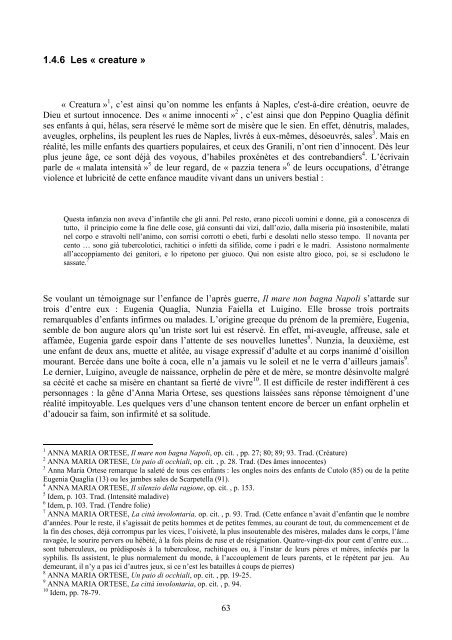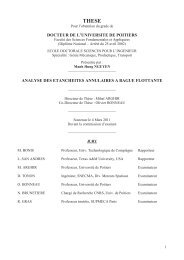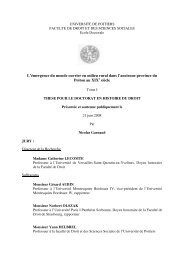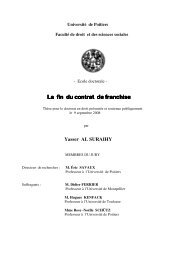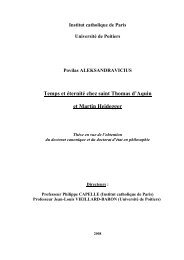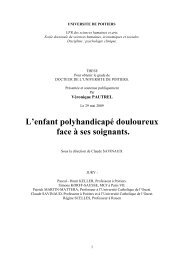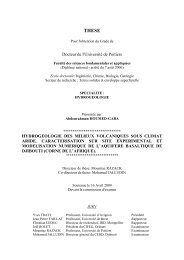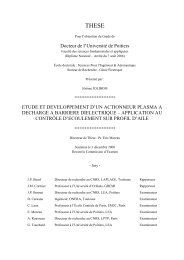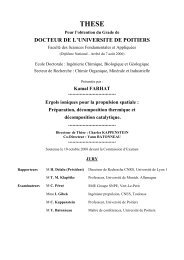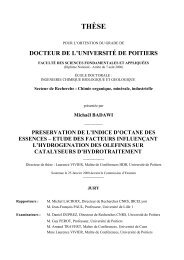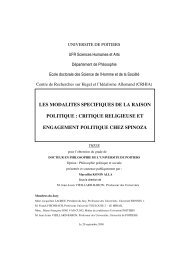Consulter le texte intégral de la thèse - Université de Poitiers
Consulter le texte intégral de la thèse - Université de Poitiers
Consulter le texte intégral de la thèse - Université de Poitiers
You also want an ePaper? Increase the reach of your titles
YUMPU automatically turns print PDFs into web optimized ePapers that Google loves.
1.4.6 Les « creature »<br />
« Creatura » 1 , c’est ainsi qu’on nomme <strong>le</strong>s enfants à Nap<strong>le</strong>s, c'est-à-dire création, oeuvre <strong>de</strong><br />
Dieu et surtout innocence. Des « anime innocenti » 2 , c’est ainsi que don Peppino Quaglia définit<br />
ses enfants à qui, hé<strong>la</strong>s, sera réservé <strong>le</strong> même sort <strong>de</strong> misère que <strong>le</strong> sien. En effet, dénutris, ma<strong>la</strong><strong>de</strong>s,<br />
aveug<strong>le</strong>s, orphelins, ils peup<strong>le</strong>nt <strong>le</strong>s rues <strong>de</strong> Nap<strong>le</strong>s, livrés à eux-mêmes, désoeuvrés, sa<strong>le</strong>s 3 . Mais en<br />
réalité, <strong>le</strong>s mil<strong>le</strong> enfants <strong>de</strong>s quartiers popu<strong>la</strong>ires, et ceux <strong>de</strong>s Granili, n’ont rien d’innocent. Dès <strong>le</strong>ur<br />
plus jeune âge, ce sont déjà <strong>de</strong>s voyous, d’habi<strong>le</strong>s proxénètes et <strong>de</strong>s contrebandiers 4 . L’écrivain<br />
par<strong>le</strong> <strong>de</strong> « ma<strong>la</strong>ta intensità » 5 <strong>de</strong> <strong>le</strong>ur regard, <strong>de</strong> « pazzia tenera » 6 <strong>de</strong> <strong>le</strong>urs occupations, d’étrange<br />
vio<strong>le</strong>nce et lubricité <strong>de</strong> cette enfance maudite vivant dans un univers bestial :<br />
Questa infanzia non aveva d’infanti<strong>le</strong> che gli anni. Pel resto, erano piccoli uomini e donne, già a conoscenza di<br />
tutto, il principio come <strong>la</strong> fine <strong>de</strong>l<strong>le</strong> cose, già consunti dai vizi, dall’ozio, dal<strong>la</strong> miseria più insostenibi<strong>le</strong>, ma<strong>la</strong>ti<br />
nel corpo e stravolti nell’animo, con sorrisi corrotti o ebeti, furbi e <strong>de</strong>so<strong>la</strong>ti nello stesso tempo. Il novanta per<br />
cento … sono già tubercolotici, rachitici o infetti da sifili<strong>de</strong>, come i padri e <strong>le</strong> madri. Assistono normalmente<br />
all’accoppiamento <strong>de</strong>i genitori, e lo ripetono per giuoco. Qui non esiste altro gioco, poi, se si escludono <strong>le</strong><br />
sassate. 7<br />
Se vou<strong>la</strong>nt un témoignage sur l’enfance <strong>de</strong> l’après guerre, Il mare non bagna Napoli s’attar<strong>de</strong> sur<br />
trois d’entre eux : Eugenia Quaglia, Nunzia Faiel<strong>la</strong> et Luigino. El<strong>le</strong> brosse trois portraits<br />
remarquab<strong>le</strong>s d’enfants infirmes ou ma<strong>la</strong><strong>de</strong>s. L’origine grecque du prénom <strong>de</strong> <strong>la</strong> première, Eugenia,<br />
semb<strong>le</strong> <strong>de</strong> bon augure alors qu’un triste sort lui est réservé. En effet, mi-aveug<strong>le</strong>, affreuse, sa<strong>le</strong> et<br />
affamée, Eugenia gar<strong>de</strong> espoir dans l’attente <strong>de</strong> ses nouvel<strong>le</strong>s lunettes 8 . Nunzia, <strong>la</strong> <strong>de</strong>uxième, est<br />
une enfant <strong>de</strong> <strong>de</strong>ux ans, muette et alitée, au visage expressif d’adulte et au corps inanimé d’oisillon<br />
mourant. Bercée dans une boîte à coca, el<strong>le</strong> n’a jamais vu <strong>le</strong> so<strong>le</strong>il et ne <strong>le</strong> verra d’ail<strong>le</strong>urs jamais 9 .<br />
Le <strong>de</strong>rnier, Luigino, aveug<strong>le</strong> <strong>de</strong> naissance, orphelin <strong>de</strong> père et <strong>de</strong> mère, se montre désinvolte malgré<br />
sa cécité et cache sa misère en chantant sa fierté <strong>de</strong> vivre 10 . Il est diffici<strong>le</strong> <strong>de</strong> rester indifférent à ces<br />
personnages : <strong>la</strong> gêne d’Anna Maria Ortese, ses questions <strong>la</strong>issées sans réponse témoignent d’une<br />
réalité impitoyab<strong>le</strong>. Les quelques vers d’une chanson tentent encore <strong>de</strong> bercer un enfant orphelin et<br />
d’adoucir sa faim, son infirmité et sa solitu<strong>de</strong>.<br />
1<br />
ANNA MARIA ORTESE, Il mare non bagna Napoli, op. cit. , pp. 27; 80; 89; 93. Trad. (Créature)<br />
2<br />
ANNA MARIA ORTESE, Un paio di occhiali, op. cit. , p. 28. Trad. (Des âmes innocentes)<br />
3<br />
Anna Maria Ortese remarque <strong>la</strong> sa<strong>le</strong>té <strong>de</strong> tous ces enfants : <strong>le</strong>s ong<strong>le</strong>s noirs <strong>de</strong>s enfants <strong>de</strong> Cutolo (85) ou <strong>de</strong> <strong>la</strong> petite<br />
Eugenia Quaglia (13) ou <strong>le</strong>s jambes sa<strong>le</strong>s <strong>de</strong> Scarpetel<strong>la</strong> (91).<br />
4<br />
ANNA MARIA ORTESE, Il si<strong>le</strong>nzio <strong>de</strong>l<strong>la</strong> ragione, op. cit. , p. 153.<br />
5<br />
I<strong>de</strong>m, p. 103. Trad. (Intensité ma<strong>la</strong>dive)<br />
6<br />
I<strong>de</strong>m, p. 103. Trad. (Tendre folie)<br />
7<br />
ANNA MARIA ORTESE, La città involontaria, op. cit. , p. 93. Trad. (Cette enfance n’avait d’enfantin que <strong>le</strong> nombre<br />
d’années. Pour <strong>le</strong> reste, il s’agissait <strong>de</strong> petits hommes et <strong>de</strong> petites femmes, au courant <strong>de</strong> tout, du commencement et <strong>de</strong><br />
<strong>la</strong> fin <strong>de</strong>s choses, déjà corrompus par <strong>le</strong>s vices, l’oisiveté, <strong>la</strong> plus insoutenab<strong>le</strong> <strong>de</strong>s misères, ma<strong>la</strong><strong>de</strong>s dans <strong>le</strong> corps, l’âme<br />
ravagée, <strong>le</strong> sourire pervers ou hébété, à <strong>la</strong> fois p<strong>le</strong>ins <strong>de</strong> ruse et <strong>de</strong> résignation. Quatre-vingt-dix pour cent d’entre eux…<br />
sont tubercu<strong>le</strong>ux, ou prédisposés à <strong>la</strong> tuberculose, rachitiques ou, à l’instar <strong>de</strong> <strong>le</strong>urs pères et mères, infectés par <strong>la</strong><br />
syphilis. Ils assistent, <strong>le</strong> plus norma<strong>le</strong>ment du mon<strong>de</strong>, à l’accoup<strong>le</strong>ment <strong>de</strong> <strong>le</strong>urs parents, et <strong>le</strong> répètent par jeu. Au<br />
<strong>de</strong>meurant, il n’y a pas ici d’autres jeux, si ce n’est <strong>le</strong>s batail<strong>le</strong>s à coups <strong>de</strong> pierres)<br />
8<br />
ANNA MARIA ORTESE, Un paio di occhiali, op. cit. , pp. 19-25.<br />
9<br />
ANNA MARIA ORTESE, La città involontaria, op. cit. , p. 94.<br />
10 I<strong>de</strong>m, pp. 78-79.<br />
63


